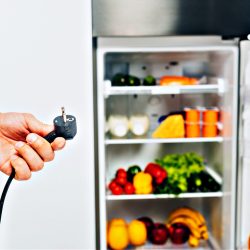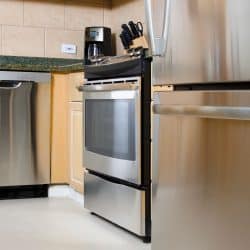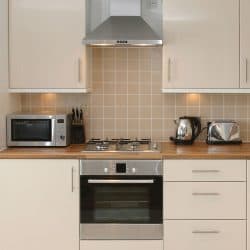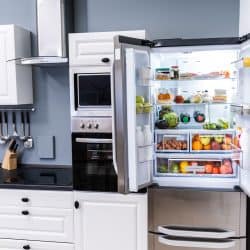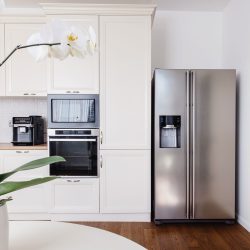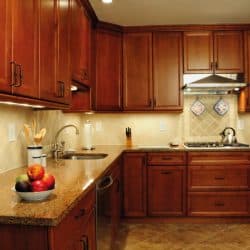Sometimes, deciding where to put the bigger appliances in your kitchen can be tricky. Do you want to try placing the refrigerator next to the stove or oven in your kitchen but don't know if this is a good idea? Well, we've done plenty of research into this topic and have the answers here for you. Let's check it out.
In general, you don't want to put a refrigerator too close to the stove or oven. Considering that both these appliances create large amounts of heat, having your fridge too close can cause it to overwork itself to stay cool. However, if you don't have an option, make sure your refrigerator and oven/stove are at least nine inches apart.
As we begin, we will cover all things refrigerator placement and discuss how and when it's okay to have yours be near the oven or stove. Whether you're moving into a new space or just bought a new fridge, we've got the answers for you. With that said, let's dive right into this post!
![Interior of a small kitchen in the apartment, Can A Refrigerator Be Next To A Stove Or Oven? [And How Close]](https://kitchenseer.com/wp-content/uploads/2022/03/Can-A-Refrigerator-Be-Next-To-A-Stove-Or-Oven..png)
How Close Can A Refrigerator Be To The Oven Or Stove?
Typically, you want to leave at least 9-12 inches between a refrigerator and oven/stove. Like we said above, the stove and oven create excess heat, which can cause trouble for your fridge.
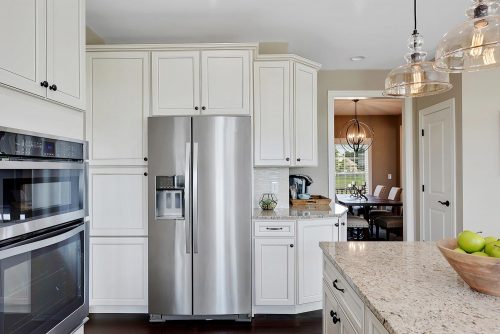
That said, if your stove or oven is electric, you can get away with having it a bit closer to your refrigerator, as it won't produce as much heat as a traditional gas option.
We would say nine inches will be sufficient. However, if your stove/oven is gas, you want to leave at least a foot between the two. Not giving your refrigerator enough space can cause it to break down over time, ultimately failing.
Again, there are ways to get around this gap requirement if your kitchen is too small, but you'll need to get crafty.
What Happens If My Fridge Is Too Close To The Oven/Stove?
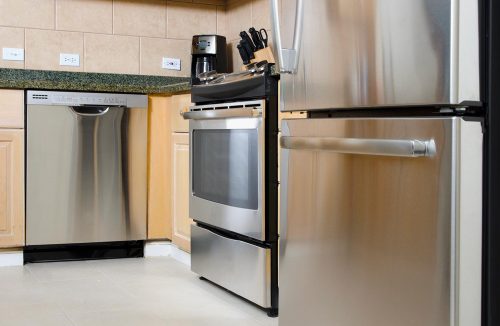
Having your refrigerator too close to the stove or oven will result in more power usage. Typically, as a fridge gets warmer from the outside, it has to use more energy to maintain its internal temperature.
If your fridge and other heat-producing appliances are too close, this can be a problem. On top of that, not leaving space between your refrigerator and oven or stove can make cleaning your kitchen harder.
According to Designing Idea, your stovetop tends to get messy while you're cooking, which can result in splattered food and liquid down the side of your fridge.
Getting these messes clean can be challenging if there aren't at least nine inches of space between the two, so again, try to follow that recommendation.
Does A Refrigerator Need Ventilation?
Yes! It's essential to give your refrigerator ventilation. At a minimum, we recommend giving your fridge a 1/2 inch of clearance on all sides. Doing this will allow it to vent any heat from its mechanics and keep it from overheating.
Furthermore, you may want to leave closer to two inches around the back of your appliance, as this is where its condenser coil(s) or exhaust vents might be.
Every fridge is different, so it's possible to see the main venting from your fridge be toward its base, while others may have it up the backside.
Should A Fridge Be On Its Own In The Kitchen?
Ideally, you should keep your fridge in its own area within the kitchen. Most importantly, your refrigerator should have a dedicated circuit, which should be able to handle up to 15 amps.
Although a fridge will typically only use between three and six amps, a spike during peak usage is possible. Additionally, giving your fridge its own outlet and space will keep it from surging or overworking itself, which will help it to stay in good working order.
On top of that, having your refrigerator be on its own can help increase its efficiency, ultimately lowering your monthly energy bill.
How Close Can A Fridge Be To The Wall?
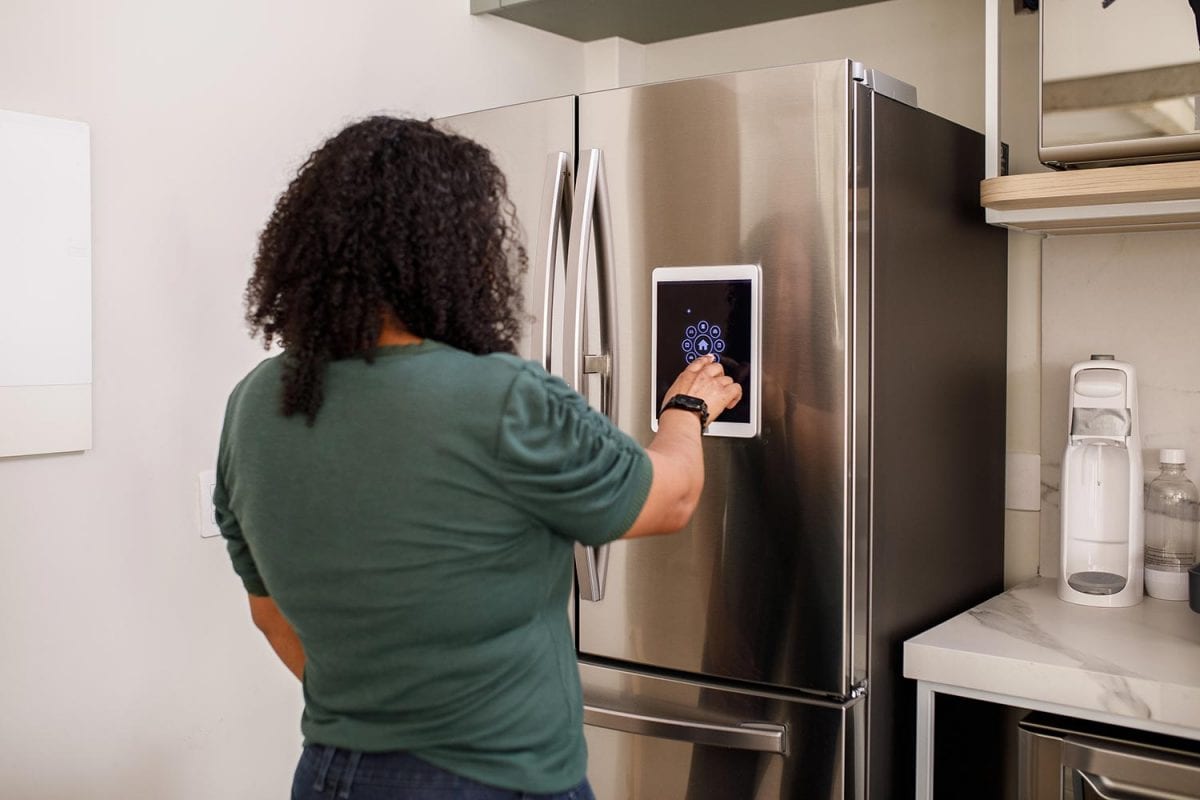
A refrigerator should be about two inches away from the wall. Like we said, if your appliance has a back coil(s), this means it needs enough room between it and the wall.
Placing a fridge too close to the wall or other structures can create poor ventilation, usually leading to more frequent overheating and maintenance issues.
Even giving your refrigerator closer to three inches from the wall can be helpful, so that's something to consider trying.
How Much Clearance Does The Top Of A Refrigerator Need?
Ideally, you want to leave at least one inch of clearance on the top of a fridge. According to Home Depot, giving your appliance enough above headspace to circulate air can keep it running smoothly.
On top of that, leaving plenty of above, side, and back-facing clearance will help your fridge last its entire expected lifespan, usually between 10-15 years.
Remember, if your refrigerator can't release its excess heat, this can cause trouble for the food inside.
Can The Refrigerator By Next To The Dishwasher?
Keep the refrigerator and dishwasher separated if you want to keep your energy bill low. Like the oven or stove, having a hot appliance like a dishwasher too close to your fridge can cause trouble.
Considering that a dishwasher gets hot and moist while on, this can make the air around it especially difficult. Moisture tends to make the air feel even warmer than it is, which will send your refrigerator into overdrive.
However, if you need to have these two appliances close by, make sure to use a divider, like wood or metal. This is common in smaller kitchens and will help keep your fridge's exterior cool.
How Much Space Do I Need To Leave Between My Fridge And Dishwasher?
Try to keep your refrigerator at least 3-4 feet away from the dishwasher. As we mentioned above, the dishwasher produces wet heat, which can be detrimental to your refrigerator's external and internal climate.
Figuring your dishwasher is under or near the sink, you should be able to accomplish this pretty easily. Again, every space will be different, so the kitchen layout can play a big part in where your bigger appliances go.
Can A Refrigerator Overheat?
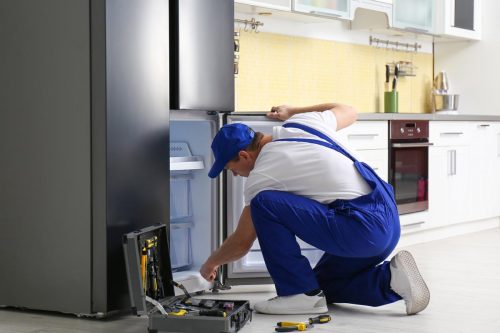
Yes, it is possible, and somewhat common, for a fridge to overheat. Especially if your home's temperature is high or your fridge is too close to heat-producing appliances, overheating can be a regular occurrence.
As we said, a refrigerator will go into overdrive if it gets too warm, so this can be serious. Additionally, the compressor on a fridge can break if it gets too hot, which can set you back up to $500.
A good way to ensure your appliance stays cool is to regularly clean its condenser coils and ensure it has proper spacing/clearance from other heat-producing systems.
Is It Normal For A Fridge To Feel Warm?
Yes, it is normal for a fridge to feel warm while on. Considering your refrigerator will use power to cycle on and off throughout the day, some heat is okay.
Generally, you won't feel this anywhere but the sides or back of your appliance. However, if the front of your fridge feels warm to the touch or the sides/back are piping hot, something's wrong.
Another thing to watch is how long your refrigerator runs if it feels too warm. If you notice it cycling on and off more than once per hour, this could mean the condenser coils are dirty or a part is defective.
What Appliances Are Safe To Go Near The Refrigerator?
In general, you are okay to put any appliance near a refrigerator, as long as you leave enough space. As we covered, the oven, stove, or even dishwasher shouldn't be right next to the fridge.
That said, if they are a few feet apart or separated by a wood/metal barrier, you should be okay. In particular, this goes for smaller kitchens where 3-5 feet of space separating your big appliance may not be doable.
Again, we recommend having a fridge be on its own, while other heat-producing appliances can be closer to one another, so that's a good general idea to follow.
How Much Space Is Needed Between Cabinets And Refrigerators?
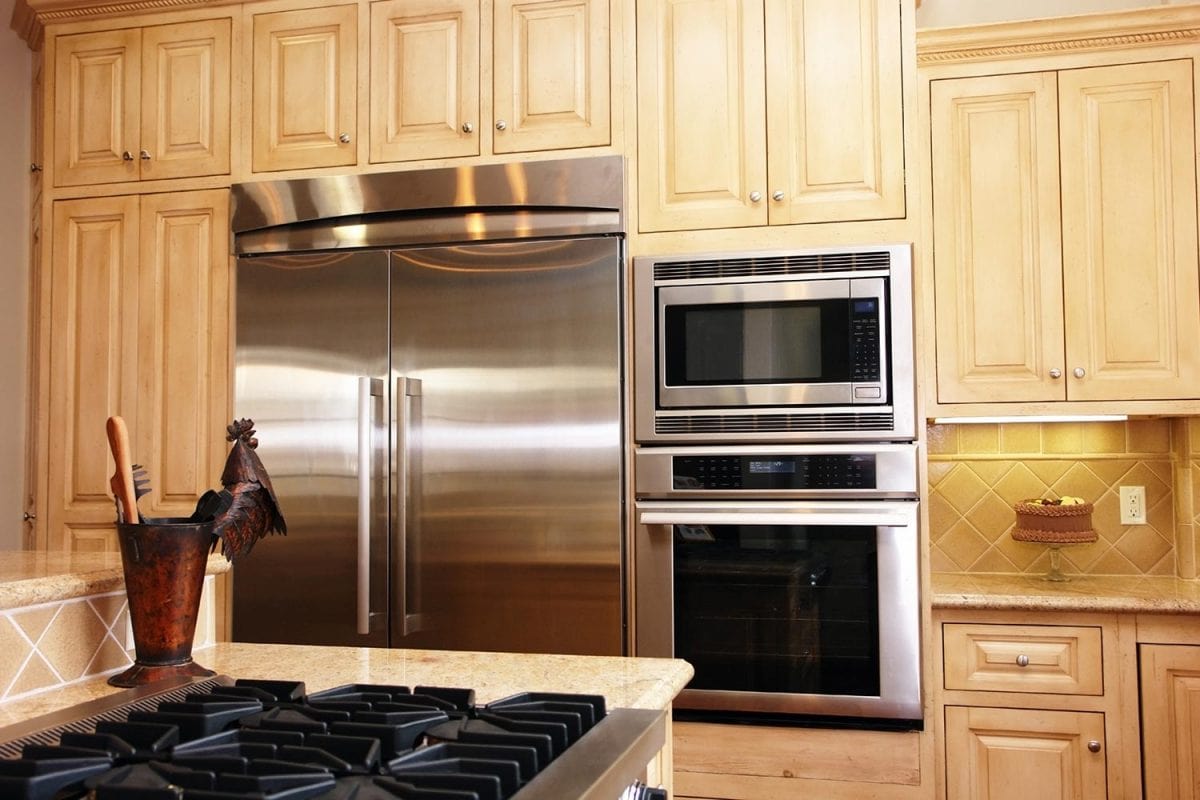
For those wanting to build cabinets around or above the fridge, this is indeed possible. Generally, you want to leave at least 1-2 inches of space between the top of your fridge and cabinetry and roughly 1/8 of an inch on either side.
That goes for any cabinet material or configuration, so make sure to plan ahead of time. Ventilation is essential for a fridge to operate safely and efficiently, so leaving plenty of clearance is a good idea.
To Wrap It All Up
Whether you want to put your fridge next to the oven or stove or need new ideas for your kitchen layout, getting the spacing correct is essential. From what we found, although you can place a refrigerator next to a stove/oven, doing this can make your appliance work harder.
Specifically, the heat from the oven or stove can cause your refrigerator to work overtime to stay cold, eventually causing more serious problems.
Doing this can also be problematic from an energy standpoint, so if you don't want a super high monthly bill, try to leave a few feet of space between your appliances.
Regardless, make sure to give your fridge at least two inches of clearance in the back and around an inch above, and don't be afraid to use a metal or wood barrier between it and other heat-producing appliances.
Made it to the end? Check out these helpful related posts below!
Can You Put A Refrigerator On Vinyl Plank Flooring?
Does Refrigerator Depth Include Doors And Handles?
Does The Refrigerator Water Filter Affect The Ice Maker?

